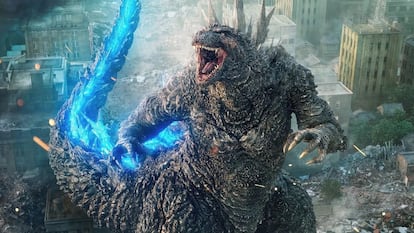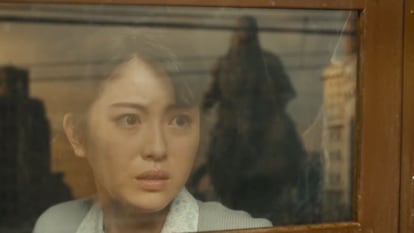Godzilla is still king
The monster, born from the fear of the atomic bomb, returns in the Oscar-nominated Japanese blockbuster ‘Godzilla Minus One’

At present, Godzilla stars in the biggest box office hit in the history of Japanese cinema, Godzilla Minus One (2023), with a worldwide gross of over $100 million. Concurrently, on Apple TV+, its presence looms over the entire storyline of the series Monarch: Legacy of Monsters, and a new American film, Godzilla x Kong: The New Empire (2024), is scheduled for release on March 27. The most famous of the kaiju remains the king.
In Godzilla Minus One, director Takashi Yamazaki takes the audience back to 1946, to a post-World War II Tokyo, to tell a story about inner struggles, mourning over the loss of loved ones and pacifism. While promoting the film, he explained: “Godzilla belongs to those years; that is why I chose to return it there. It was a period of considerable chaos, there were hardly any weapons and people had to use other means to defeat it. In addition, another of the keys to its success is that it has always told a human story in parallel.”
In his film, that Tokyo in ruins becomes the perfect portrait of a population that was led to believe that it was all-powerful and obtained nothing but destruction, defeat and the nightmare of being the first victims of nuclear horror. In his autobiography, filmmaker Akira Kurosawa perfectly describes the mood of the people in those years: “On August 15, 1945, I was summoned to the studio along with everyone else to listen to the momentous proclamation on the radio: the Emperor himself was to speak over the air waves. I will never forget the scenes I saw as I walked the streets that day. On the way from Soshigaya to the studios in Kinuta the shopping street looked fully prepared for the Honorable Death of the Hundred Million. The atmosphere was tense, panicked. There were even shop-owners who had taken their Japanese swords from their sheaths and sat staring at the bare blades.”

Enrique López Lavigne, producer of the movie I’m Going to Have a Good Time, explains that the first half hour of the film narrates “the events that lead to the appearance of Godzilla: the atomic bomb and the destruction of Tokyo, where the only neighborhood that is not devastated is Ginza, and Godzilla destroys it. It is almost a historical film.”
Ishirô Honda’s Godzilla (1954) marked the screen debut of the monster. Released three years after the end of the American occupation, it was taken as a metaphor from the beginning. “Many readings have been done,” explains Oriol Estrada, Japan specialist, writer and creator of Espai Daruma, a community for Japanese culture enthusiasts in Barcelona, Spain. “The easiest one to understand is that Godzilla is a metaphor for nuclear devastation. But there are those who believe that it is a reflection on the role of the Japanese in the Pacific War, and whether they deserved what they got,” he points out.
One of the characters in Godzilla Minus One states that “not having fought in the war is something to be proud of,” and the main character, Shikishima, a failed kamikaze pilot played by Ryunosuke Kamiki, “blames himself for having survived, which causes him a lot of pain in his heart,” explains the actor. In Godzilla Minus One, the strict Japanese honor of those years is redefined through a series of complex characters who know the futility of war and the opportunity that peace represents.
The emotional scars are complemented by the physical ones. “Consider that Godzilla’s appearance,” says López Lavigne, “is rough and resembles the wounds and scars left by the atomic bombs on the civilian population.” The most spectacular sequence in Godzilla Minus One — the monster’s attack on the Ginza neighborhood — ends with an explosion and a mushroom cloud followed by a black rain, similar to the one that fell on the population of Hiroshima and Nagasaki, liquid radioactivity that ended up causing as many deaths as the deflagrations. A powerful anti-war image. Gareth Edwards, the director in charge of reviving Godzilla in Hollywood as a franchise in 2014, has acknowledged that Minus One paves the way for future productions about the Japanese titan.
“Beyond the monster, the Japanese Godzilla is a demigod,” says López Lavigne, “while the American Godzilla is basically a monster.” Estrada agrees: “Every time the U.S. releases a new version, in Japan they shake their heads and go, ‘Hold my beer — let me show you how it’s done.’ That’s what happened with Shin Godzilla, which was a huge success. They may love Godzilla in the United States, but I don’t think they’ve ever understood, or tried to understand, its cultural background.”
If in the main Japanese films the colossus is a destructive force with a particular fixation on Tokyo, in the recent American versions it is a sort of guardian of humanity that protects us from other MUTOs (Massive Unidentified Terrestrial Organisms) bent on destroying San Francisco (New York practically disappeared as the setting of brutal destruction after 9/11). If in Japan Godzilla is a metaphor for nuclear horror, in the U.S. it becomes a protective weapon; we already know that in Godzilla x Kong: The New Empire that approach is repeated, with both creatures joining forces to defend humanity from a global threat.
As for the Apple TV+ series Monarch: Legacy of Monsters, the viewers have gone through 10 episodes without really enjoying its charms. “I really like these types of experiments, but I don’t think it adds a lot. It disappointed me a little,” says López Lavigne. “Just like The Mandalorian is capable of contributing something to the Star Wars universe, this adds quite little to that of Godzilla. As in the films produced by Legendary, it is nothing more than a prehistoric monster straight out of Jurassic Park.”

Godzilla returns and attacks everything at once, everywhere, and does it in times of global upheaval. “I think Godzilla symbolizes all the problems we have in the world: Covid-19, the invasion of Ukraine, the conflict in Palestine... It is the representation of everything,” says director Takashi Yamazaki. For López Lavigne, “the coincidence of two very different films that address the nuclear dangers, Oppenheimer and Godzilla, is curious. The fear of the atomic reappears; the uncertainty of the future is back. The kaiju resurfaces every time there is fear, and it does so as an enemy.”
While Christopher Nolan’s Oppenheimer has received 13 Oscar nominations, Godzilla Minus One only managed to scratch out one nod, for its superb visual effects. However, beyond the coincidence pointed out by López Lavigne, three things are certain: one, that the monster is not going anywhere anytime soon; two, that the Japanese did not care for the disregard shown by Nolan’s film for the tragedy of Hiroshima and Nagasaki (so much so, that its release is scheduled for 2024, one year later than in the rest of the world); and three, that both were a commercial success. Perhaps Hollywood will opt for a different duel than Nolan’s film versus Barbie — that much-celebrated phenomenon known as Barbenheimer — and pit Godzilla against Oppenheimer; maybe we could call it Godziheimer.
Sign up for our weekly newsletter to get more English-language news coverage from EL PAÍS USA Edition
Tu suscripción se está usando en otro dispositivo
¿Quieres añadir otro usuario a tu suscripción?
Si continúas leyendo en este dispositivo, no se podrá leer en el otro.
FlechaTu suscripción se está usando en otro dispositivo y solo puedes acceder a EL PAÍS desde un dispositivo a la vez.
Si quieres compartir tu cuenta, cambia tu suscripción a la modalidad Premium, así podrás añadir otro usuario. Cada uno accederá con su propia cuenta de email, lo que os permitirá personalizar vuestra experiencia en EL PAÍS.
¿Tienes una suscripción de empresa? Accede aquí para contratar más cuentas.
En el caso de no saber quién está usando tu cuenta, te recomendamos cambiar tu contraseña aquí.
Si decides continuar compartiendo tu cuenta, este mensaje se mostrará en tu dispositivo y en el de la otra persona que está usando tu cuenta de forma indefinida, afectando a tu experiencia de lectura. Puedes consultar aquí los términos y condiciones de la suscripción digital.








































